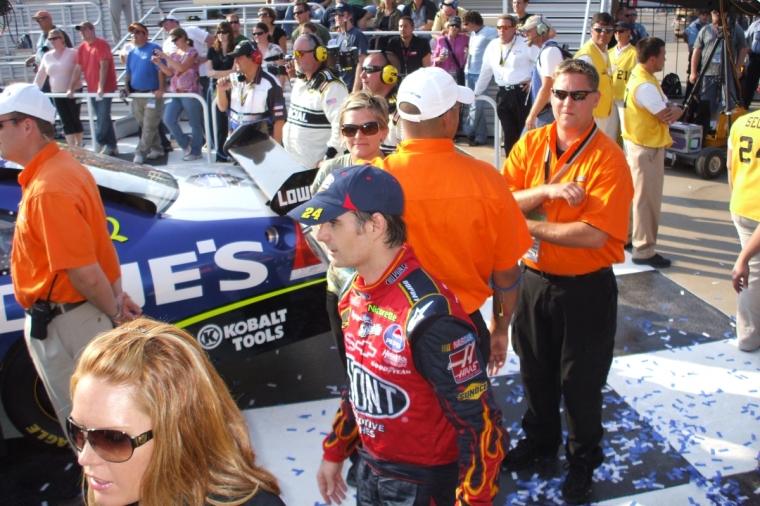COMMENTARY: Jeff Gordon's legacy of faith is 'more private' at the end of his career

MIAMI (CHRISTIAN EXAMINER) — Petty. Earnhardt. Gordon.
Those are the three eras of NASCAR that pundits have mentioned over the past few weeks as Jeff Gordon's racing career drew to a close November 22 at Homestead-Miami Speedway.
And nobody is arguing with putting Gordon in such company.
Over his 23-year Sprint Cup career, the 44-year-old won 93 races (placing him third all-time behind Richard Petty and David Pearson), three Daytona 500s and four series championships. He had 475 top-1o finishes in 797 consecutive (a record) starts. That means he finished in the top 10 nearly 60 percent of the time he climbed into a racecar.
Even so, Gordon's career has always been about more than the numbers — something Petty talked about in a piece he narrated about Gordon's career for Fox Sports recently.
"It's the beauty of our sport," Petty says in the piece. "We pass along what we've built to the next generation to see where they can take it, and Jeff Gordon was the right man, at the right time to bring racing to a whole new level.
"Talk shows (hosting "Saturday Night Live" and filling in on "Live with Regis and Kelly"), board rooms and Madison Avenue — this young man was comfortable everywhere. And it's a good thing, too. Because our sport — thanks in a big part to him — was about to explode."
Even though he wasn't always liked by diehard NASCAR fans (winners rarely are, especially early in their career), the outsider who came from open-wheel racing on dirt tracks became the ambassador for the sport in nearly every way, bringing NASCAR into the mainstream. Eventually, he won over the fans, as well.
Gordon captured his first Sprint Cup title in just his third full season of competition at the age of 24, opening the door for many young drivers who previously hadn't been given a chance. He had looks, charm and immeasurable talent. He also had a philanthropist spirit.
The Jeff Gordon Children's Foundation is involved in pediatric cancer research, treatment and patient support programs, including Jeff Gordon Children's Hospital in Concord, North Carolina. According to the foundation's website, the organization has raised more than $15 million. In 2011, the foundation expanded its efforts to bring pediatric cancer care to Rwanda, Africa.
In the first half of his career, he began to talk about his newfound Christian faith. You can find his testimony on the Motor Racing Outreach website. And in a 2001 interview with Beliefnet.com, he said he had committed his life to Christ.
He seemed to pull back on his public expression of faith later in his career, though. That's not a judgment, just an observation from afar. One that is confirmed in the November 23, 2015 issue of "Sports Illustrated."
"I wasn't brought up [with religion]," he says in the article. "It was something I got introduced to when I came into the Cup Series. I explored it and learned a lot from that experience. I feel it's helped make me a better person, but I choose to do it more privately now."
For me, one moment in his career stands out. It isn't all that spectacular, in an of itself, but its a snapshot of who he is.
As the 2008 season was winding down, Jimmie Johnson and Carl Edwards were locked in a battle for the championship as they headed to the Kansas Speedway in late September. Edwards tried his now-famous slide job on Johnson at the end of the race as the two were going for the win, but he got into the fence and Johnson went on to capture the flag.
Gordon, who had been sick all weekend, finished fourth that day in a close battle with Greg Biffle, who edged him out at the finish line. When Gordon climbed from his car, he said he was aching all over.
That's why I was surprised to see him enter Victory Lane after the race to congratulate Johnson on his win. I happened to be in Victory Lane that day, covering the race. Gordon was sweating profusely and still didn't look well. But he wanted to celebrate with his teammate and friend.
He stuck around for a few minutes, talking to Johnson and the rest of his team. And then he slipped away without much fanfare.
That's sort of who he became over the years — a quiet champion who would rather show you who he is than talk about it.
Lee Warren is the author of "Racin''Flat Out for Christ: Spiritual Lessons from the World of NASCAR." He has interviewed numerous NASCAR drivers for features in various publications such as Baptist Press Sports, Yahoo! Sports, and others.